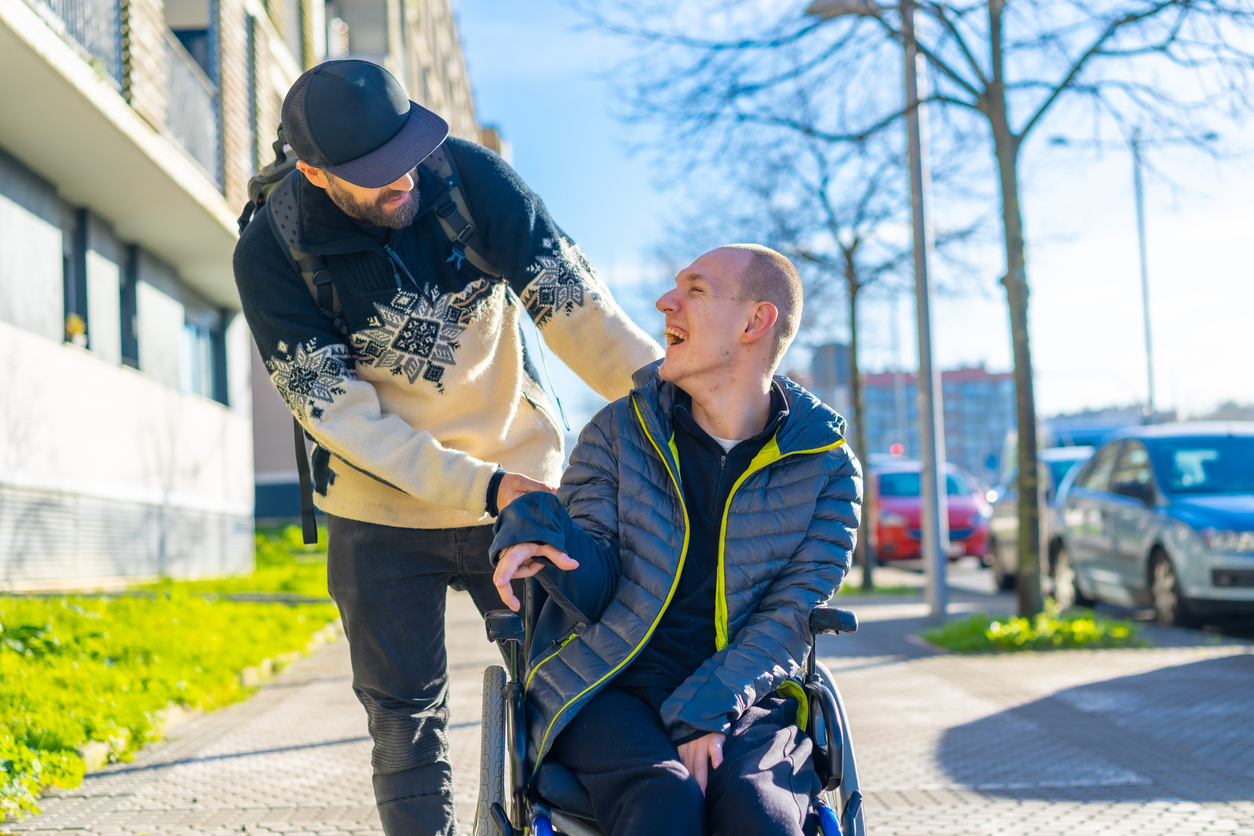Aging with a Disability

Aging with a disability can be challenging, but the great news is that people with physical disabilities such as spinal cord injury (SCI), Cerebral Palsy, and Multiple Sclerosis are living longer healthier lives. It is also true, however, that for some people with a disability the effects of aging can set in younger than in the able-bodied populations1, and special considerations should be made to promote an optimal level of physical and mental wellness. No two people experience aging the same way. Quality of life as we age is a complex mix of physical, lifestyle, environmental, mental, and emotional factors.
Aging with a Disability: Body Functionality and Aging for People with SCI
All body systems begin to lose some functionality as aging progresses. For people with SCI, aging may also be impacted by:
- Age at injury
- Level and severity of injury
- Level of health of pulmonary, skin, cardiovascular, bladder, and bowel systems
- Access to community services and social support
Health Risks and Aging for People with SCI
While the below-listed bodily systems can deteriorate with age for everyone, they can pose unique risks to people with SCI:
- Musculoskeletal system
- Skin Health
- Cardiovascular system
- Gastrointestinal function
- Respiratory function
It is essential to prioritize preventative care to protect these essential body systems as people with SCI age.
Cardiovascular Health
As they age, people with SCI may experience a gradual increase in systolic and diastolic blood pressures, loss of arterial elasticity, and increased risk for DVT/PE and orthostatic hypotension. To reduce risk of these age-related cardiovascular risk factors, it’s important to eat a balanced, healthy diet, maintain a regular exercise regime (range of motion exercises can work for people with limited mobility), and have a regular cardiovascular assessment.
Respiratory Health
As people with SCI age they may have diminished respiratory capacity, increased incidence of sleep apnea, higher risk of respiratory infection, and loss of lung and chest wall compliance. To allow for optimum respiratory health when aging, it’s important to stay active, practice deep breathing, stop smoking (if you smoke), stay on top of pneumonia and flu immunizations, and get a regular respiratory assessment to catch any potential problems early.
Musculoskeletal Health
Aging often comes with bodily aches and pains, but there can also be arthritic changes and/or an increase in bone degeneration. Osteoporosis is another age-related condition that can affect musculoskeletal health. People with SCI are particularly prone to joint stiffness, decreased muscle strength, and “overuse syndrome” in the shoulders. It’s important for people with SCI to get regular joint assessments as they age, and a regular review of equipment to determine if any modifications are needed. There are preventative measures that can be implemented to preserve joint health if any problems arise.
Protecting the Skin
Skin thins and becomes more fragile as we age. It loses collagen and elasticity, making it more prone to bruising, tearing, and pressure injury development. For people with SCI, protecting skin is an integral aspect of overall health and wellness as well as preventing infections. It’s essential to wear a sun barrier product on the skin all year (not just in summer). Wearing loose-fitting clothing helps avoid a build up of moisture on the skin. When a person gets older, their ability to shift their weight regularly to avoid pressure injury may decrease, so it may be necessary to have additional caregiver assistance. Regular assessment of equipment usage to determine risk of bruising or skin tearing is also important to make any equipment modifications to help protect the skin.
Gastrointestinal Health
Aging can bring changes to gastrointestinal functions, which can be particularly problematic for people with SCI. Increased incontinence, constipation, and hemorrhoids are the most common age-related gastrointestinal changes. People with SCI are not more prone to colon cancer than able-bodied people, but it’s still essential get a routine colonoscopy starting at age 45. For people with SCI there is a risk of autonomic dysreflexia, so it’s important to schedule colonoscopies with a Gastroenterologist (GI) with training in performing this procedure on people with SCI. Diet and medication changes may be needed with age to maintain optimum gastrointestinal health. It’s a good idea to evaluate your routine bowel program to ensure it is still effective as you age. Consider the need for increased attendant care to help prevent any bowel-related problems.
Enemeez® and Enemeez® Plus
The Enemeez® formulation is a hyperosmotic, stool-softening laxative that works by drawing water into the bowel from surrounding body tissues. The docusate sodium in this mini enema product prepares the stool to readily mix with watery fluids. It softens and loosens stool and initiates a normal, replicated bowel movement, typically within 2-15 minutes. Enemeez® Plus is the same formulation as Enemeez®, with the addition of 20mg of benzocaine, assisting in the anesthetization of the rectum and lower bowel. This formulation was developed for patients who experience autonomic dysreflexia, hemorrhoids, anal fissures, or painful bowel movements. Disclaimer: The material contained is for reference purposes only. Quest Healthcare, A Division of Quest Products, LLC, does not assume responsibility for patient care. Consult a physician prior to use. Copyright 2021 Quest Healthcare, A Division of Quest Products, LLC. Sources: 1 https://www.physio-pedia.com/Healthy_Aging_with_Spinal_Cord_Injury#cite_note-1 https://sci.washington.edu/info/forums/reports/aging_6.09.asp https://craighospital.org/resources/aging-and-spinal-cord-injury












